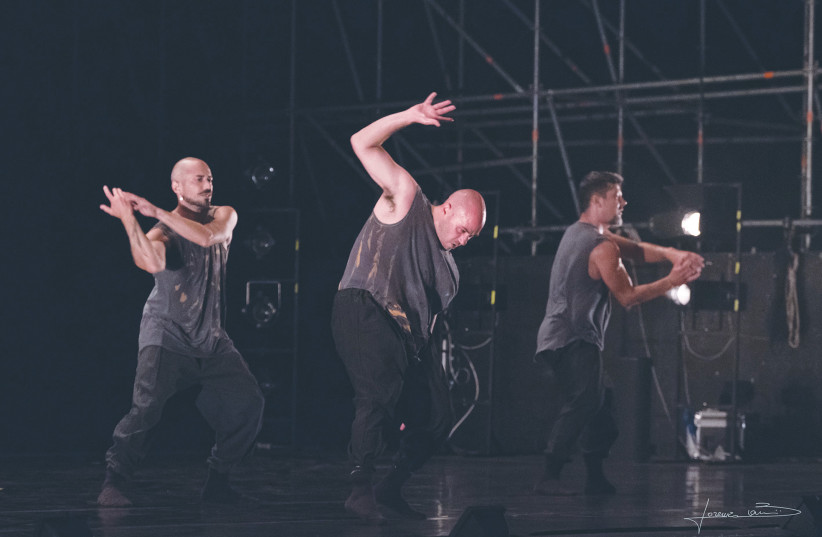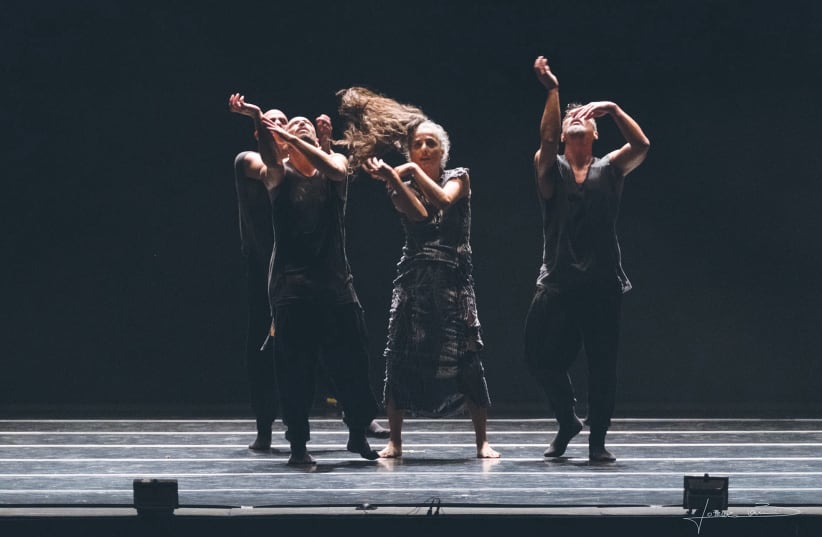For much of her illustrious career, Orly Portal’s creations turned stages into women-only spaces. Her choreography is often described using the word “femininity.” However, in her newest work, Fakarouni, which will be presented at the Suzanne Dellal Center at the end of the month, Portal surrounded herself with men.
“I was very excited and afraid to work with men,” says Portal over the phone. It is early afternoon and Portal, 52, is at her home in Ein Hayam battling a tooth infection. A veteran choreographer and performer, Portal’s artistic language is comprised of traditional music and movement themes catapulted into the here and now. She is an entrancing performer and is known to weave together her myriad skills seamlessly: playing instruments, singing, text and movement.
In Fakarouni, which is named after a song by legendary Egyptian singer Umm Kulthum and means “thing about me” or “remember me,” Portal is joined by dancers Anderson Braz, Artour Astman and Erez Zohar. But getting into the studio wasn’t without its challenges and concerns for Portal.
“I was afraid I wouldn’t feel the same flow. There’s something in working with women that I am very connected to, and the creation comes. It’s what I am used to and what I have researched in my body.”
“I felt ready to work with men. It felt so natural and balanced. The creation and the flow were so much greater than I thought, it allowed for things I couldn’t have done before. I felt this sense of alchemy; that new things were coming out of me. Artour, Anderson and Erez gave me feedback – not ‘Orly, you’re amazing’ but real feedback. They gave me expression, inspiration and confidence. It was almost ecstatic,” says Portal.


As for the choice of Umm Kulthum, Portal explains, “Her voice burns me. She sets my soul ablaze. Her voice creates friction. It isn’t gentle, soft, or clean; rather it is phenomenally precise. I think the combination of roughness and precision is her genius.”
In listening to Umm Kulthum, first as a girl in her family home and later as an adult, Portal felt the notes resonate within her body and spirit.
“I’m interested in what’s hiding underneath her voice as well. She was an independent woman. She had a very high level of intelligence that frightened men. She could have been a leader. In her music, she wove her force, her independence, her education and her history. Her songs are love songs, most of which are about love that wasn’t fulfilled. She talks about what will happen if those loves will come to fruition and she does so using analogies from the natural world. To me, her voice is an expression of freedom.”
On a personal level, Portal connects with Umm Kulthum’s simultaneous desire for and rejection of love, her insistence on independence in love.
“She didn’t have relationships. And I am a person who loves love. It has a big place in my life. At the same time, I am an independent woman. My independence isn’t canceled by my love for love.”
It seems that Fakarouni is a creation that could not have happened one moment sooner than it did. In this work, Portal draws on decades of physical and mental research and juxtaposes her expertise with three phenomenal dancers.
“Age is present in the mental sense, emotionally less and physically it’s there. But there are qualities that I’ve only arrived at now. My age has given me a different power and I like it,” she says.
Usually, Portal spends the first 30 minutes of Fakarouni in the wings while her dancers perform the opening section. In that time, she tries to relax.
“I try but it’s impossible. No matter how prepared I am, five minutes before I go on stage, the nerves set in. Every time.” Perhaps it is this thrill that keeps Portal on stage. Perhaps it is her ability to constantly deepen her craft and find new expressions for the things that move her. Regardless of her reasons, Portal is and continues to be a gift to the Israeli stage.
Fakarouni will be performed at the Suzanne Dellal Center on August 26 and 27. For more information, visit www.suzannedellal.org.il.
